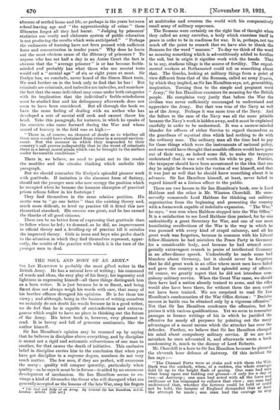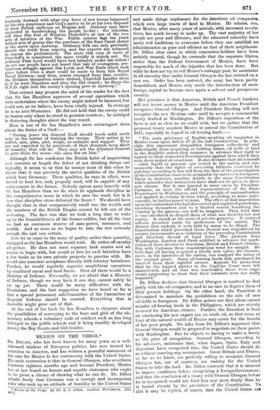THE SOUL AND BODY OF AN ARMY.*
SIR Lin HAMILTON is probably the most gifted writer in the British Army. He has a natural love of writing ; his command of words and ideas, the easy play of his fancy, his ingenuity and lightness in expressing himself—all these things distinguish him as a born writer. It is just because he is so fluent, and being fluent does not always weigh his words with care, that many of his brother officers disregard his opinions. Ho is for them too viewy ; and although, being in the business of writing ourselves we certainly do not doubt his words because he is a good writer, we do feel that ho is capable of contradictions and extrava- gances which ought to have no place in thinking out the future of the Army. His latest book is, however, very pleasant to read. It is breezy and full of generous sentiments, like the author himself.
Sir Ian Hamilton's opinion may be summed up by saying that he believes in discipline above everything, and by discipline is meant not a rigid and automatic subservience of one man to another, for that causes the death of initiative. This exclusive belief in discipline carries him to the conclusion that when you have got discipline in a supreme degree, numbers do not very much matter. The few men, if they are perfect, will overcome the many ; quality will conquer quantity, particularly when quality—as he says it must be in future—is aided by an enormous development of mechanism. Sir Ian Hamilton seems to en- visage a kind of Alexander the Great who will disregard what are generally accepted as the lessons of the late War, snap his fingers • 1lie Soul and Body of an Army. By General Sir Ian Eamllton, G.O.B. London : Arnold. [18e. net.)
at multitudes and overrun the world with his comparatively small army of military supermen.
The Romans were certainly on the right line of thought when they called an army exercises, a body which exercises itself in
peace in order to be in readiness for war. It is, perhaps, not to much off the point to remark that we have also to thank the Romans for the word " manure." To-day we think of the word as meaning something which is adventitiously added to fertilize the soil, but in origin it signifies work with the hands. That is to say, studious tillage is the source of fertility. The experi- mental workers at Rothamsted could tell us something about that. The Greeks, looking at military things from a point of view different from that of the Romans, called an army irparcit, by which they implied, as Sir Ian Hamilton says, art, generalship, inspiration. Turning then to the simple and pregnant word " Army," Sir Ian Hamilton examines its meaning for the Britisii people. He complains very justly that before the War the civilian was never sufficiently encouraged to understand and appreciate the Army. But that was true of the Navy as well as of the Army. Perhaps it was more true of the Navy. And the failure in the ease of the Navy was all the more pitiable because the Navy's work is hidden away, and it must be explained carefully in order to be understood. It was a narrow-minded blunder for officers of either Service to regard themselves as the guardians of mystical rites which had nothing to do with the ordinary man. The oidina7 man all the time had to pay for these things which were the instruments of national policy, and one would have thought that sensible officers would have gone out of their way, as indeed some did, to make the taxpayer understand that it was well worth his while to pay. Further, the taxpayer should have been accustomed to the idea that one day he might be drawn into the vortex of war himself, and that it was just as well that he should know something about it in advance. Sir Ian Hamilton himself, at least, never failed to regard himself as a liaison officer to the public.
There are two heroes in Sir Ian Hamilton's book, one is Lord Haldane and the other is Mr. Winston Churchill. Ho unre- servedly commends Lord Haldane for thinking out military organization from the beginning and presenting the country with a framework capable of indefinite expansion. " The War," he says, " was won when Haldane stepped into the War Office." It is a satisfaction to see Lord Haldane thus praised, for he was undoubtedly a great Secretary for War, and one of our most humiliating recollections of the War is the way in which he was pursued with every kind of stupid calumny, and all his great work was forgotten, because in common with his Liberal fellow-Ministers he had mistaken the Peace Party in Germany for a considerable body, and because he had uttered some genially extravagant remark in praise of intellectual Germany in an after-dinner speech. Undoubtedly he made some bad blunders about Germany, but it should never be forgotten that he did 'great work in an office where most men have failed and 'gave the country a small but splendid army of offence. Of course, we greatly regret that he did not introduce com- pulsory military service. When the Great War came, we should then have had a nation already trained to arms, and the rifles would also have been there, for without them the men could not have been trained. We are surprised to read Sir Ian Hamilton's condemnation of the War Office dictum " Decisive success in battle can be obtained only by a vigorous offensive."
Not that Sir Ian Hamilton condemns the offensive, but he praises it with various qualifications. Yet we seem to remember passages in former writings of his in which he justified the offensive for nearly all purposes by pointing out the many advantages of a moral nature which the attacker has over the defender. Further, we believe that Sir Ian Hamilton changed his mind about compulsory military service. If we are not mistaken he once advocated it, and afterwards wrote a book condemning it, much to the dismay of Lord Roberts. Mr. Churchill is a hero to Sir Ian Hamilton because he planned the eleventh hour defence of Antwerp. Of this incident Sir
Ian says :— " The Channel Ports were at stake and with them the Win Dark was the outlook, when, of a sudden, the whole strategic field lit up to the bright flash of genius. One man had woo what hung upon our holding our ground—if only for a day Or, two—at Antwerp ; one man had acted with all the force and swiftness at his command to enforce that view ; one man had understood that, whether the fortress could be held or could not be held, the honour of England demanded that at least the attempt be made ; one man had the courage to step fearlessly forward with what tiny force of raw troops happened by his own prescience and God's mercy to lie at his own disposal to show British uniforms on Belgian soil. Jealousy may have succeeded in hoodwinking the people to-day ; the historian will class this feat of Winston Churchill's as one of the two acts of intuition of the War. Public opinion lags ten years behind acts of genius like the purchase of the Suez Canal shares or the move upon Antwerp. Ordinary folk can only gradually absorb the truth from experts, and the experts are ashamed to expose the professionals. The more this coup de main of Churchill's is considered, the more vividly it stands out. No ordinary First Lord would have had infantry under his orders 1 As yet our people have not heard that tale of courageous, per- tinacious struggle against Sea Lords and War Earls which took place before even a start could be made to form this Royal Naval Division—and then, scarce emerged from that combat, the Division themselves scarce clothed, Churchill handles them as if he were Napoleon and they the Old Guard ; he flings the R.N.D. right into the enemy's opening jaws at Antwerp 1"
That extract may prepare the mind of the reader for the fact that Sir Ian Hamilton approves of several operations which were undertaken where the enemy might indeed be harassed, but could not, as we believe, have been vitally injured. In strategy he is an anti-Westerner. He did not hold that the enemy could be beaten only where he stood in greatest numbers ; he indulged in flattering thoughts about the way round.
Here is one of Sir Ian Hamilton's more extravagant dicta about the duties of a Staff :- "During peace the General Staff should touch solid earth only in the matter of training the troops. Their métier is to reflect, aim, plan, plot, weigh, co-ordinate and suggest. They are not expected to be practical—if their demands keep short of insanity, that will do. They may ask the Adjutant-General to give them the moon—the onus hes on him."
Although Sir Ian condemns the British habit of improvising and censures at length the defect of not thinking things out logically, it seems to us that he unsays most of this when he shows that it was precisely the native qualities of the British which beat Germany. These qualities, ho says in effect, were bound to beat her, and, properly used, will be capable of any achievement in the future. Nobody agrees more heartily with Sir Ian Hamilton than we do when he applauds discipline in the comprehensive sense in which he uses the word, but is it true that discipline alone defeated the Boers ? We should have thought that in that comparatively small war the wealth and the numbers of the British Empire cannot be left out of the reckoning. The fact was that we took a long timo to wake up to the formidableness of the farmer-soldier, but all the time we had an enormous reserve of man-power, resources, and wealth. And as soon as we began to take the war seriously enough the end was certain.
Now let us come to the army of quality rather than quantity, equipped as Sir Ian Hamilton would wish. He writes off cavalry altogether. He does not want separate tank armies and air armies to begin with, but would at first let each battalion have a few tanks as its own private property to practise with. Ho would also associate aeroplanes directly with infantry battalions.
Further, he would regularly organize amphibious operations by combined naval and land forces. Over all there would be a Ministry of Defence. Personally, we aro afraid that a Ministry of Defence, though we may have it one day, cannot safely be set up yet. There would be many difficulties with the Dominions, and the best suggestion we have heard so far is that a special permanent sub-Committee of the Committee of Imperial Defence should be created. Everything that is desirable might grow out of that.
At the end of his book Sir Ian Hamilton is eloquent about the possibilities of conveying to the boys and girls of the ele- mentary schools a voluntary code of conduct such as has long belonged to the public schools and is being steadily developed among the Boy Scouts and Girl Guides.







































 Previous page
Previous page